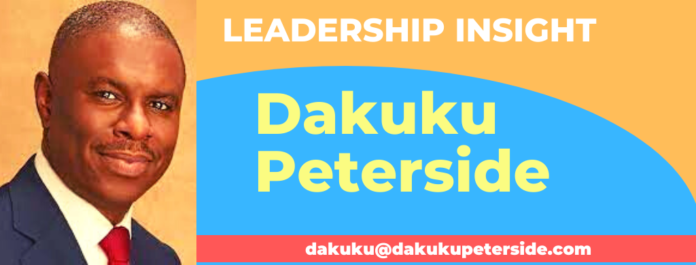Sense and nonsense of Nigeria’s economic crisis
Nigeria is probably in the worst economic crisis of a generation, screamed The New York Times on June 11, 2024. Two other influential global publications, Foreign Affairs and The Economist, had earlier said the same thing under different headlines. Although Nigeria’s economy is not yet in a recession, all other economic indicators have gone south, and the curve is not bending in the short run. Statistics on inflation (above 33%), youth unemployment (above 50%), poverty levels (over 133 million multidimensionally poor), the value of the Naira (over 200% decline against dollar in the past year), education (18.3 million out of school children), healthcare (inadequate health facilities and professionals), insecurity (144th position in the 2023 safest countries in the world ranking), and homelessness (24.4 million people without a home) are frightening. More than ever, Nigeria needs crisis leaders to turn things around.
Great leaders have always come up to guide their countries out of the worst crises throughout history. The American people looked up to Barack Obama in 2008 to lead the nation through its worst economic crisis since the Great Depression. He conducted many consultations and made critical but well-considered decisions to lay a new economic foundation. We are in an “economic war’ and cannot use the tools applicable in normal times.
Leadership during normal times is different from leading in the storm which is the subject of my forthcoming book. The expertise and skill set required for both cases are different. The dynamism and multiplicity of socio-economic and political factors converging to create the Nigerian volatile ecosystem are such that effective crisis leadership is needed at all governance strata. Although required in normal times, these crisis leadership competencies are most relevant during a crisis. They include sensemaking, effective decision-making, team coordination, facilitating learning, emotional intelligence, and effective communication. It is the masterful use of these competencies that makes great crisis leaders.
The commentariat have attributed our present economic crisis to a cycle of thoughtless policies, squandering as governance, negative or low investment in innovation, uncoordinated economic thinking and placing of politics above commonsense economic frugality. It is also true that our poor understanding of the interplay of global events and its impact on local economic factors also contributed. The consequence is the country’s inability to respond to vulnerabilities, shocks and opportunities.
Nigerian leaders need to make sense of these complex circumstances. The situation requires a more focused perspective on historical and immediate causes and possible solutions to the current crisis. Sensemaking is critical to effective crisis leadership, especially in complex and diverse environments like Nigeria. Sensemaking involves gathering information and putting it in context, exploring different perspectives to develop a coherent narrative, and interpreting and understanding complex, ambiguous, and rapidly changing situations to guide decision-making and action. During this economic crisis, sensemaking allows leaders to comprehend its scope, identify its root causes, anticipate its impacts, and develop appropriate responses. This piece will focus on and explore sensemaking as the first step in crisis leadership.
Our leaders must develop a contextual understanding and historical context of our economic crisis. Nigeria is characterised by significant cultural, ethnic, and economic diversity. Effective crisis leadership requires leaders to understand these complexities, how they influence the crisis, and the potential responses. Economic crises in Nigeria often have roots in historical issues such as colonial legacies, policy missteps, structural inequalities and global turbulence. Leaders must consider these historical contexts to grasp the crisis’ nuances fully. They must identify and interpret economic, social, and political signals.
READ ALSO: American democracy’s Trump test
Dakuku Peterside’s ‘American Democracy’s Trump Test’: A Rebuttal
Furthermore, the way our leaders frame this economic crisis matters. We often have the tendency to reduce complex issues to one or two narratives. This is what my Kellogg Professor, Loran Nordgren calls “narrow framing”. Based on the robust content analysis we carried out, we identified the dominant frame of this economic crisis by the government as ‘inherited and requires tough actions that will cause some pain to the citizens in the short run, but the pain is necessary for achieving better economic prosperity in the medium to long term’. The danger of this framing is that it sounds more like an excuse than a creative strategy to upturn our economic woes. This frame lulls our leaders to the proverbial sleep of inertia – inaction when there is fire on the mountain.
How this economic crisis is communicated to the public and stakeholders influences their perceptions and reactions. Effective crisis leadership involves framing and communicating the situation in an understandable and actionable way for diverse audiences. Little wonder Nigerians are at a loss regarding our political class’s perceived poor choices. The government needs to rethink its crisis communication strategy.
Since economic crises are by their very nature dynamic and unpredictable, leaders must update their understanding of the issues, modify their response strategy and adapt their strategies accordingly. Involving various stakeholders, including experts, community leaders, and affected populations, enriches the process, and ensures more comprehensive insights. This comprehensive insight allows crisis leaders to make informed decisions that cater to the greater good. Things like government being more prudent, quitting luxury spending, reducing taxes to encourage savings and investment, fixing insecurity to encourage inflow of investment and borrowing less from external sources, are easily intelligible choices.
To illustrate the importance of deep insight in Nigerian leadership during the economic crisis, let us examine three recent crises. The first is the economic recession of 2016. The 2016 recession was triggered by a significant drop in oil prices and compounded by policy challenges and security issues. Our leaders needed to interpret the interconnected causes, including global oil dynamics, domestic economic policies, and security concerns in the Niger Delta. The Economic Recovery and Growth Plan (ERGP) was developed as a response, focusing on diversification and stabilisation. While the ERGP provided a strategic framework, the process highlighted the need for consistent policy implementation and addressing underlying structural issues. This still needs to be done, and our leaders have yet to learn any lessons they could apply in subsequent crises.
The second is the current economic crisis that has been exacerbated due to the implementation of fuel subsidy removal policy. Every Nigerian knows the need to remove fuel subsidies, but it takes work. Periodic attempts to remove fuel subsidies faced public resistance due to their impact on living costs and inflation. Our leaders needed to balance fiscal sustainability with socio-economic impacts. Understanding public sentiment and economic realities was crucial in framing and communicating subsidy reforms. Subsidy removals were often met with protests, highlighting the need for transparent communication, phased implementation, and accompanying social protection measures.
However, the hurried end of the subsidy without mapping the multiple scenario implications and making adequate provisions to cushion the impact threw our economy into a whirlwind of desperation, and the repercussions have been devastating, as indicated in the above economic statistics. Developing multiple scenarios based on different interpretations of the crisis helps prepare for various potential outcomes. Effective sensemaking includes proactive risk management and contingency planning. Lack of effective policy management is creating more public angst than the actual policy itself.
The third is the unintended devastating impact of harmonisation of the exchange rate during a period of dollar crunch and scarcity without remedial provisions for the inflationary implications of a devalued Naira in an import-dependent economy. The Naira has collapsed by over 200% in the past year, forcing the prices of all imported goods to follow suit. The combo of exchange rate-induced inflation and subsidy removal inflation has resulted in the worst inflationary rate in a generation in Nigeria.
Crisis leaders are problem solvers. They can adjust plans, policies, and responses as new information is gathered or situations change. This means listening to stakeholders, voices of reason, and experts. The reoccurring question throughout this economic crisis is: Where are our crisis leaders? Political leaders are poor crisis leaders because they fail to recognise the warning indications of impending challenges and rarely put the lessons they have learnt from past crises into practice.
Decision-making in a position of leadership is challenging. It is more significant when a decision impacts the lives of numerous individuals. Our leaders at various strata have yet to appreciate this. Decisions are often made without the rigour of clear thinking or fall back to the narrow framing of A or B. Lack of strategic foresight and thinking abilities manifest in most of our decisions.
Therefore, Nigerian leaders must deeply analyse the crisis’ economic, social, political, and cultural dimensions. This involves understanding both macroeconomic trends and grassroots realities. They should engage with various stakeholders to enrich the sensemaking process. Collaboration with experts, community leaders, and international partners provides diverse insights and fosters collective action. Sensemaking is not a one-time activity but a continuous process. Leaders must remain open to new information, willing to reassess situations, and ready to adapt strategies as the crisis evolves. Transparent and consistent communication will help them in managing public perceptions and reactions.













